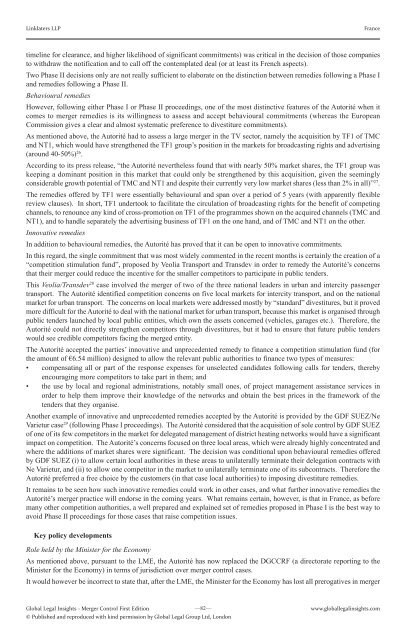Merger Controls First Edition - J Sagar Associates
Merger Controls First Edition - J Sagar Associates
Merger Controls First Edition - J Sagar Associates
Create successful ePaper yourself
Turn your PDF publications into a flip-book with our unique Google optimized e-Paper software.
Linklaters LLP France<br />
timeline for clearance, and higher likelihood of significant commitments) was critical in the decision of those companies<br />
to withdraw the notification and to call off the contemplated deal (or at least its French aspects).<br />
Two Phase II decisions only are not really sufficient to elaborate on the distinction between remedies following a Phase I<br />
and remedies following a Phase II.<br />
Behavioural remedies<br />
However, following either Phase I or Phase II proceedings, one of the most distinctive features of the Autorité when it<br />
comes to merger remedies is its willingness to assess and accept behavioural commitments (whereas the European<br />
Commission gives a clear and almost systematic preference to divestiture commitments).<br />
As mentioned above, the Autorité had to assess a large merger in the TV sector, namely the acquisition by TF1 of TMC<br />
and NT1, which would have strengthened the TF1 group’s position in the markets for broadcasting rights and advertising<br />
(around 40-50%) 26 .<br />
According to its press release, “the Autorité nevertheless found that with nearly 50% market shares, the TF1 group was<br />
keeping a dominant position in this market that could only be strengthened by this acquisition, given the seemingly<br />
considerable growth potential of TMC and NT1 and despite their currently very low market shares (less than 2% in all)” 27 .<br />
The remedies offered by TF1 were essentially behavioural and span over a period of 5 years (with apparently flexible<br />
review clauses). In short, TF1 undertook to facilitate the circulation of broadcasting rights for the benefit of competing<br />
channels, to renounce any kind of cross-promotion on TF1 of the programmes shown on the acquired channels (TMC and<br />
NT1), and to handle separately the advertising business of TF1 on the one hand, and of TMC and NT1 on the other.<br />
Innovative remedies<br />
In addition to behavioural remedies, the Autorité has proved that it can be open to innovative commitments.<br />
In this regard, the single commitment that was most widely commented in the recent months is certainly the creation of a<br />
“competition stimulation fund”, proposed by Veolia Transport and Transdev in order to remedy the Autorité’s concerns<br />
that their merger could reduce the incentive for the smaller competitors to participate in public tenders.<br />
This Veolia/Transdev28 case involved the merger of two of the three national leaders in urban and intercity passenger<br />
transport. The Autorité identified competition concerns on five local markets for intercity transport, and on the national<br />
market for urban transport. The concerns on local markets were addressed mostly by “standard” divestitures, but it proved<br />
more difficult for the Autorité to deal with the national market for urban transport, because this market is organised through<br />
public tenders launched by local public entities, which own the assets concerned (vehicles, garages etc.). Therefore, the<br />
Autorité could not directly strengthen competitors through divestitures, but it had to ensure that future public tenders<br />
would see credible competitors facing the merged entity.<br />
The Autorité accepted the parties’ innovative and unprecedented remedy to finance a competition stimulation fund (for<br />
the amount of €6.54 million) designed to allow the relevant public authorities to finance two types of measures:<br />
• compensating all or part of the response expenses for unselected candidates following calls for tenders, thereby<br />
encouraging more competitors to take part in them; and<br />
• the use by local and regional administrations, notably small ones, of project management assistance services in<br />
order to help them improve their knowledge of the networks and obtain the best prices in the framework of the<br />
tenders that they organise.<br />
Another example of innovative and unprecedented remedies accepted by the Autorité is provided by the GDF SUEZ/Ne<br />
Varietur case29 (following Phase I proceedings). The Autorité considered that the acquisition of sole control by GDF SUEZ<br />
of one of its few competitors in the market for delegated management of district heating networks would have a significant<br />
impact on competition. The Autorité’s concerns focused on three local areas, which were already highly concentrated and<br />
where the additions of market shares were significant. The decision was conditional upon behavioural remedies offered<br />
by GDF SUEZ (i) to allow certain local authorities in these areas to unilaterally terminate their delegation contracts with<br />
Ne Varietur, and (ii) to allow one competitor in the market to unilaterally terminate one of its subcontracts. Therefore the<br />
Autorité preferred a free choice by the customers (in that case local authorities) to imposing divestiture remedies.<br />
It remains to be seen how such innovative remedies could work in other cases, and what further innovative remedies the<br />
Autorité’s merger practice will endorse in the coming years. What remains certain, however, is that in France, as before<br />
many other competition authorities, a well prepared and explained set of remedies proposed in Phase I is the best way to<br />
avoid Phase II proceedings for those cases that raise competition issues.<br />
Key policy developments<br />
Role held by the Minister for the Economy<br />
As mentioned above, pursuant to the LME, the Autorité has now replaced the DGCCRF (a directorate reporting to the<br />
Minister for the Economy) in terms of jurisdiction over merger control cases.<br />
It would however be incorrect to state that, after the LME, the Minister for the Economy has lost all prerogatives in merger<br />
Global Legal Insights <strong>Merger</strong> Control <strong>First</strong> <strong>Edition</strong><br />
—82—<br />
© Published and reproduced with kind permission by Global Legal Group Ltd, London<br />
www.globallegalinsights.com


